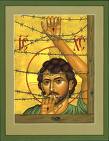
Mass aboard the USS Enterprise
A new school year is beginning in the Northern Hemisphere and many students who have always gone to Church with their families now find themselves addressing the question, “Why should I go to Church?” Some will have been asking it for many years. Others will ask it for the first time in the next few weeks, as other activities and concerns vie for their attention and time.
For those who began questioning their family’s practice early, the answers they received as children may have ranged from “Because” to “That’s what our family does” to “No, God doesn’t need us to go to Church, but we need to go to Church,” to “When you’re grown up, you can decide, but until then, we go to Church on Sunday.” None of these answers satisfies the questioner. If truth be told, they don’t really satisfy the one answering the question either.
So really, why should anyone go to Church? Sometimes Mass is boring. In some parishes liturgy feels rushed; in others it seems to take far too long. Sometimes it seems only to be a matter of completing a ritual in the expectation that then God will have to pay attention to those who perform it. Sermons are sometimes dull and not at all related to questions children and teens face in their daily lives. The same old songs are sung every week. Young people don’t feel welcomed in the music group – only the “old” people who’ve been singing forever decide what to sing and how to sing it. Pastors sometimes seem more interested in getting everyone to contribute to the collection than to getting everyone involved in parish activities or ministry. The idea of contributing from “Time, Talent, and Treasure” seems to undervalue the Time and Talent of teens and young adults in favor of the Treasure they are perceived to have. In short, there are lots of perfectly justifiable reasons not to go to Mass on Sunday.
As a mother, daughter, aunt, catechist, godmother, grandmother, and friend, I watch family and friends struggle with this issue. I was blessed to grow up during Vatican II and to have had wonderful experiences of liturgy and community as a child, teen, and young adult. It was never an issue for me. I loved it all. Yet many of my siblings, their spouses, and their children have had different experiences and find membership in a worshipping community less essential as part of their daily lives. So I ask myself as well, “Why should anyone go to Church?”
The answers I find range from selfishly pragmatic to possibly theologically justifiable. They are certainly not the only reasons. They are simply reasons I can suggest from my own experience and studies.
1. Church communities are made up of good people who will generally try to help when problems arise in people’s lives. It’s a good idea to get involved with good people and form mutually supportive relationships before you need them. Things may be going well now, but that won’t last forever. When everything starts crashing down around you, it’s good to have someone who’ll try to help you hold the umbrella to deflect the debris, pick up the pieces to start over again, or simply be with you to hold your hand in support and love when nothing else can be done.
2. Members of church communities may become lifelong friends who share a culture of belief and values. This doesn’t always happen and sometimes those same friends may break apart for a time over nuances of belief, changing values, or practical questions such as where their children will attend school. Nevertheless, with time, love, patience, and forgiveness, members of a community will find that reconciliation occurs and the bonds deepen in subtle ways. The friendship may not be the same as it was originally, but when the chips are down, the bond remains.
3. God is Trinity – Three in One yet Undivided Unity. Without each of the members of the Trinity, God would be lacking. Together, God is complete. Jesus counted on His Father for support during His life on Earth. He must have listened to the Spirit in His healing ministry – how else to know which of the many people he met would be open to receive healing? The Father was glorified through Jesus’ teaching and life. The Holy Spirit is our advocate, cheerleader, and helper – the way God is with us in this time following the Resurrection.
If God is, in a sense, a community, who are we to turn our backs on community?
4. Jesus developed and relied on a community of friends during his lifetime. Some were closer confidants than others, but each played an important role in his life. They worshipped together. They ate together. They traveled together. They laughed and cried together. They did all the kinds of things that Christians have done with each other through the ages. They even fought with each other sometimes and were rebuked by Jesus when they got out of line or totally missed the point of what He was trying to teach them. Some betrayed Him. Some denied him. Some ran away when He was arrested. But He never turned any of them away or refused to forgive and be reconciled with them.
It was out of this experience of community that the Church grew – many different people, from many different lands, languages, and traditions, coming together to encourage and support each other as followers of The Way.
5. The Church is the Mystical Body of Christ. Jesus is not physically present here today in the same way He was before His death and resurrection. St. Paul explained the early understanding of the Christian community, that each person has a specific role to play within the Church, just as each part of a physical body has its own function. If any member of the body is missing, the entire body is weakened. That includes everyone who has been baptized into the community – of all ages, sexes, genders, races, interests, gifts, and talents. If anyone is missing, we are all diminished.
6. We meet Jesus through each other. This draws from the concept of the Mystical Body. It’s not something about which we generally speak. Many times we don’t recognize this reality. However, when a group of tradesmen comes together to add rooms to the home of a member of their parish who has many children and not enough space for them, Jesus has come. When a death occurs in a family, and the ladies of the parish host a reception following the funeral, Jesus has come to that family. When a friend gives an afternoon to help build a cabinet for a family’s new bathroom, Jesus has come. When a much desired pregnancy ends unexpectedly and a child’s teacher stops to visit the grieving mother after school, Jesus has come. When a family gathers to celebrate a wedding or an anniversary and friends come from miles around to join them, Jesus has come, blessing them all.
7. Christianity is not an easy path to follow. Christians are called to take unpopular positions. To feed the hungry. To clothe the naked. To care for the poor and strangers in the community. To visit those in prison. To care for the sick. To “speak truth to power.” Following Jesus will inevitably lead to experiences of the cross. It’s not easy to take a stand contrary to that of people who are powerful. It’s not easy to express an opinion that is contrary to that of one’s family and friends. At home, at work, at school, in public life, times will arise when an individual will have to stand firm, refuse to go along with what everyone else is doing or saying, and experience the pain of being unpopular, ridiculed, censured, isolated, or passed over for a promotion. Some have even had to pay the ultimate price in their witness. We call them martyrs, a word that means witnesses.
8. In gathering for liturgy (Mass or other celebrations), we share in giving thanks for God’s great gifts and we eat the food that Jesus has given to transform us and give us the strength to continue His work in our world. We meet and get to know each other through our companionship at church. Out of this gathering, all the other benefits already mentioned can and will grow, including the neat side-effect of having a community to support us when we need help too!
Read More


















